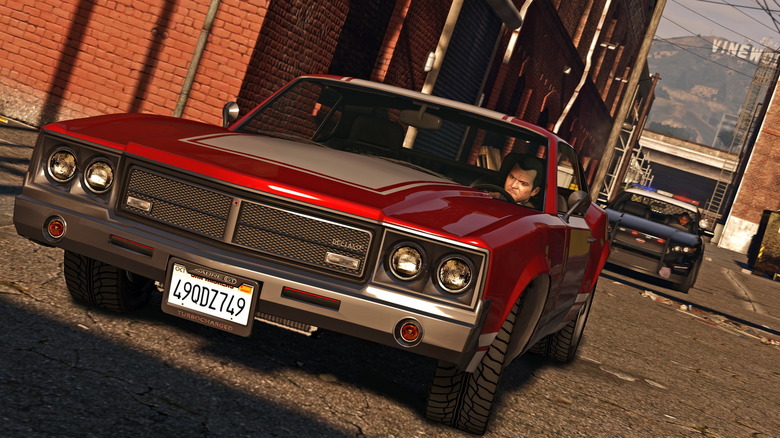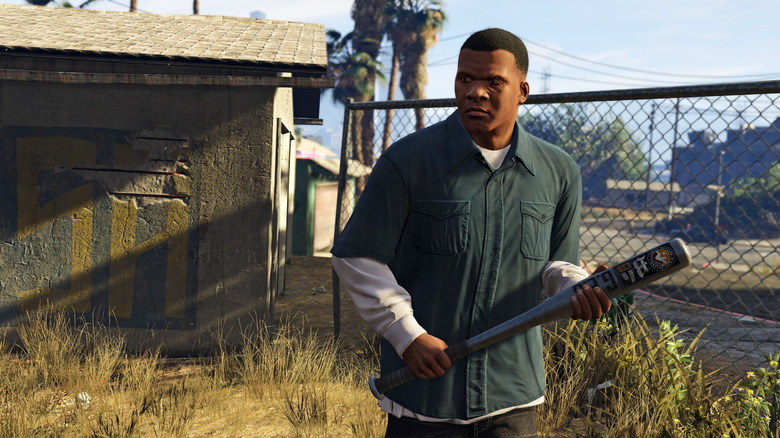Here's Why A Grand Theft Auto Movie Never Happened
There was a time when video game movies were something of a joke. Hollywood inevitably tried to adapt popular games for the big screen beginning in the '90s with the disastrous live-action "Super Mario Bros." movie but, for the most part, they were almost always bad. Even the "Resident Evil" franchise, which was commercially successful, never churned out a single critical hit. Things have changed but it's only in recent years that the tide has begun to turn. That's precisely why we never got a "Grand Theft Auto" movie, despite lots of interest from various studios over the years.
Former head writer and VP of creativity at Rockstar Games Dan Houser, who also co-founded the successful gaming company, recently spoke with The Ankler about Hollywood's attempts to turn "Grand Theft Auto" into a movie. Houser explained that, "After a few awkward dates, we'd ask [the executives], why would we do this?" The answer to that question was "because you get to make a movie." That didn't set well, as Houser explained.
"We'd be like, no, what you've described is you making a movie and us having no control and taking a huge risk that we're going to end up paying for with something that belongs to us."
Studios had their own ideas of how to tackle popular video game IP for the big screen, assuming they could do it well without the creatives behind the games involved. That's how we end up with major misfires like "Doom." The brass at the studios assumed Rockstar would jump at the chance to get a movie made. Houser and the rest of the team knew that was a shortsighted way of thinking.
"They thought we'd be blinded by the lights and that just wasn't the case. We had what we considered to be multi-billion-dollar IP, and the economics never made sense. The risk never made sense. In those days, the perception was that games made poor-quality movies. [...] It's a different time now."
Video game adaptations have come a long way
It's important to examine Houser's proclamation that it's a different time now. In recent years, we've seen a massive shift in video game adaptations. Movies like "Sonic the Hedgehog" and "Detective Pikachu" certainly helped break the curse, only for last year's "The Super Mario Bros. Movie" and "Five Nights at Freddy's" to become unqualified blockbuster smash hits. In some cases, critics still aren't on the side of these movies, but audiences are responding to them, which is more important in the end. But there are major critical success stories too, such as director Josh Ruben's "Werewolves Within."
On the small screen, things are arguably even more promising. Netflix's "Castlevania" series remains one of the more heralded video game adaptations of any kind. We've also had huge hits such as "The Last of Us," which broke viewership records for HBO, and "Fallout" on Amazon Prime Video. The point is, there is no longer a presumption that video game adaptations are going to stink.
It's remarkably easy to see why "Grand Theft Auto" would be an attractive bit of IP to chase. 2013's "Grand Theft Auto V" alone has sold more than 200 million copies and generated more than $8.5 billion since its release. The series, overall, has sold more than 425 million units, with "Grand Theft Auto VI" on the way next year. The audience is massive.
So, what about the future? Could Rockstar circle back around to Hollywood now that things have changed? Could people like Houser be given some creative control for a TV show or movie set within the world of "GTA"? It doesn't seem as unlikely as it once did but it does seem like Hollywood needs this IP more than it needs Hollywood.
"Grand Theft Auto VI" is set to arrive in 2025.

